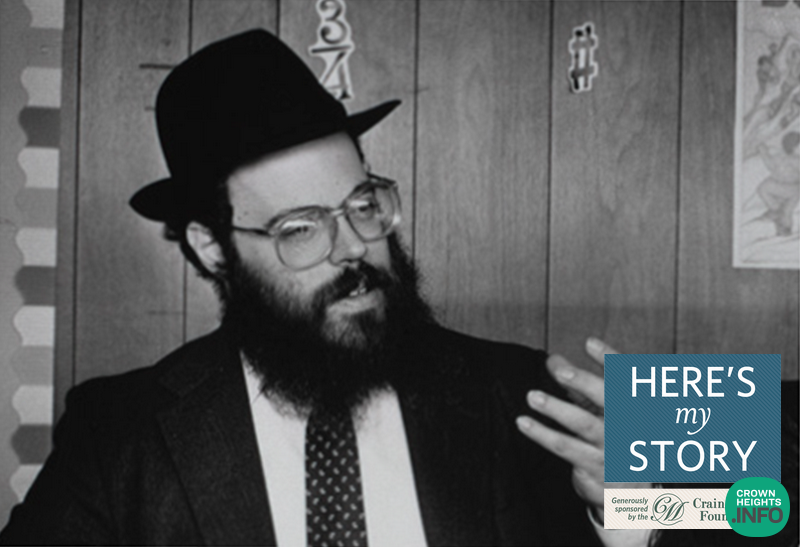
Here’s My Story: I Could Have Driven To Cuba!
Rabbi Yossi Groner
Click here for a PDF version of this edition of Here’s My Story, or visit the My Encounter Blog.
I first visited the Carolinas as a young yeshivah student in the ‘70s, when I was sent there as part of Chabad’s summer outreach program and began developing relationships with people from both states.
After I got married, my wife Mariashi and I considered moving to Charlotte, the largest city in North Carolina, to serve there as Chabad emissaries on a permanent basis. The Rebbe’s secretary, Rabbi Hodakov, encouraged us to look into it seriously, and when we wrote to the Rebbe about the idea, he gave us his blessing, while instructing us to first build a mikveh there.
A few years later, though, our mission expanded beyond Charlotte. It was 1988, and I was visiting Crown Heights when I went to see the Rebbe. At that time, the Rebbe was mourning the passing of his wife, Rebbetzin Chaya Mushka, and the regular prayer services were being held in his home. After the service, the Rebbe handed out dollars for people to give to charity.
When I went by, the Rebbe looked at me, gave me an extra dollar, and said, with a wave of his hand, “This is for your entire state.”
When I came home, I told my wife, “Chabad is going to open in Raleigh.” The Rebbe had said “the entire state,” so it had to be in a central place like Raleigh, the capital of North Carolina.
That very night, I listened to a message on my answering machine. It was from a Jewish lawyer who lived in Raleigh. The committee of Raleigh’s Congregation Shaarei Israel had just met, he informed me, and they had decided that they wanted to partner with Chabad.
The Rebbe’s words were not just a passing remark. When he said, “This is for the entire state,” it was a clear indication that something significant was happening and that we had to respond to it. Indeed, Shaarei Israel ultimately merged with Chabad, and Rabbi Pinny Herman moved to Raleigh to serve as a Chabad emissary there.
We continued to expand in the following years, but in 1991, we fell behind on some bills from a building project. I didn’t tell people about it, but we were facing serious financial challenges. Feeling the pressure, I told my wife that the situation demanded that I go to the Rebbe for Simchat Torah. After arranging for the other Chabad rabbis to conduct the services, I drove up from North Carolina — an eleven-hour trip — with two of my children, arriving on Hoshana Rabbah.
That afternoon, the Rebbe was handing out honey cake, as was his custom. When I passed by, he gave me a piece, with a dollar for me to give to charity. But as I started to move on, he called me back, looked at me intently, and gave me another piece with a big smile while he said, “This is so that you should have financial abundance.” Later, I asked my father, who was one of the Rebbe’s secretaries, if he had mentioned anything about my situation. He hadn’t: The Rebbe simply sensed it.
That night, Shemini Atzeret, the Rebbe suddenly gave a talk right after the services. During this unexpected talk, the Rebbe gave a series of blessings for the New Year, using all twenty-two letters of the Hebrew Alef-Bet. For the letters chof and lammed, he referred to a “year of abundant sustenance” (kalkalah) and a “year of abundant Torah learning” (limud). Then he looked directly at me and reiterated, “Since there will be abundant sustenance, there will be peace of body and mind that allows one to study Torah with abundance.”
The very next day, a member of the Chabad community — a wealthy philanthropist who had heard about the blessing the Rebbe had given me — made a large pledge to be paid over the coming year. It was exactly what we needed, and it was completely unexpected.
So, the morning after the holiday, I wrote a note to the Rebbe reporting the pledge and thanking him for his blessing. Shortly after the morning prayers, my father told me that the Rebbe had received my note and responded that he would mention me in prayer at the resting place of the Previous Rebbe.
A few hours after that, I was getting ready for the long drive back to Charlotte, but someone suggested I wait just a little longer, as the Rebbe was about to leave 770 to go to the Previous Rebbe’s resting place. “You have one more opportunity to see the Rebbe,” he said. “Why don’t you stick around?”
I headed to my father’s office, which was in the front of 770, not far from the Rebbe’s room. There were a handful of other people standing there when suddenly, the Rebbe’s door opened, and he came out, with my father behind him.
We hadn’t expected him to come out so quickly, and so we all just stood there silently, as if frozen. As he walked past us, the Rebbe took out some coins and gave each of us a nickel to put in the charity box affixed to the wall of my father’s office.
I was still standing there when the Rebbe suddenly turned back to me and said, “I hear that you already received a donation.”
He then began walking again, but I felt I had to answer. “The Rebbe’s blessing has been fulfilled,” I said.
The Rebbe turned back to give me a penetrating look. He lifted his hand and said, in a raised voice, “This is only the beginning!” Then he turned and walked down the steps to his car.
It was an unforgettable moment: The Rebbe sensed the need of one of his emissaries and responded to it without even waiting to be asked.
I felt so energized that, despite barely sleeping for the past four nights, I didn’t need any caffeine to keep me up for the drive back to Charlotte. I could have driven all the way to Cuba on the adrenaline I got from that exchange.
I don’t wish any hardship on anyone, of course, but sometimes I wonder whether those challenging times were worth it just for that exchange, to feel the Rebbe’s presence so directly.
I felt how deeply the Rebbe empathized with his emissaries. We couldn’t always be with him, because we had responsibilities in our own communities, but even so, the Rebbe was always there to give the helping hand that we needed to push forward.
Rabbi Yossi Groner has served as the leading Chabad emissary to North and South Carolina since 1980. He was interviewed in May of 2013.













